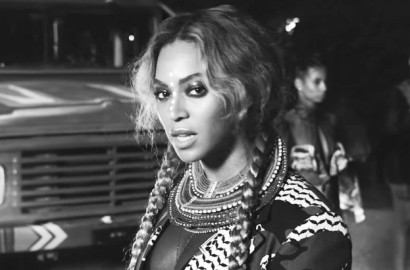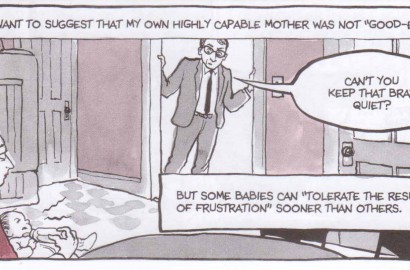Let’s make a canon! And let’s fill it with queer art, or queer-ish art, or art that has no idea how queer it is. Queer art is often secret art: black-market, whispered-about, read-between-the-lines art. And since secret art can be hard to find, let’s shine a light on a few of our favourite things so all our friends can see them.
We’ll call it a canon, because it sounds Weighty and Important and Serious, but we also won’t be too serious about it. We won’t make The Canon, just a canon. Each month, we’ll chat with a different queer-about-town and ask them to submit something to the canon. And they’ll tell us what that book or play or movie or TV episode or sculpture or poem or dance piece or opera or photograph or painting or performance art piece or anything else means to them and why they think it deserves a spot in our illustrious canon.
This month, we talked to Sarah-Tai Black, writer and curator of the film series Black Gold, about Mariah Carey’s much-maligned star vehicle Glitter.
Tell me what you wanna talk about.
I think I’m gonna go with Glitter. The film, the movement, the lifestyle.
Nice! I’ve never seen Glitter!
It is underrated. And overrated as a bad movie.
When it came out, all of the talk around it was “Is this the worst movie of all time?”
I feel strongly that it’s essential viewing for queer people, especially queers of colour, especially black queers of colour, Afro/Latinx queers of colour.
What’s it even about?
I often compare it to Purple Rain, and people think I’m being facetious, but I’m not. Because narratively, Purple Rain is not a “good movie.” And neither is Glitter. You have this biracial character facing family problems, doing their music, working their way through performing, being a star. The central premise very much works on the Tragic Mullata stereotype. She is a foster kid raised with two other girls and she’s trying to find her mom, who is a black jazz singer with some addiction issues. Wants to be a star, becomes a star, fin. Finds her mother—spoiler alert.
Who plays her mom?
I don’t know. Unknown.
I feel like that would be a great place for some stunt casting.
No, but don’t worry, cause there’s other exciting casting, including Terrence Howard, Padma Lakshmi, Eric Benét, Da Brat…
Oh my god!
It hasn’t really been recuperated into a cult canon. And cult canons are so overwhelmingly white and straight-coded, even though they’re campy. Take Showgirls for instance. That’s a very gay movie. But it’s overwhelmingly white.
And the racial politics of that movie are so uncomfortable!
For so long, what has been labeled as cult or camp is dictated by whiteness—and at the same time, queerness, which is why we have Showgirls. But every queer or trans person I’ve talked to who’s seen Glitter has been like “This relates to my experience,” and I’m like “I know, right?” It’s so obvious to me, and it’s aggravating that it doesn’t get the same… I’m not talking critical accolades here, but the same kind of investment and treatment respecting a different, diverse experience of what camp is and what cult is. And obviously, all of this is not separate from me and my experiences. This was the early 2000s, I was a 12-year-old queer kid seeing an explicitly biracial, light-skinned black girl telling her story, you know? Mariah just gives so much. She doesn’t acknowledge her light-skinned privilege, which she should, but she’s such a star for never letting people forget that she’s biracial—even though she passes so easily. I feel so many things about the way the movie was received. People are so quick to dismiss any kind of femininity that isn’t working in favour of what things “should” look like. And it’s just so gay!
Why is it so gay?
Mariah’s whole persona is just overly excess signifiers of femininity. It’s not even straight anymore.
She’s pretty drag.
Another big thing for me, especially as I get older, is I’ve really come to love Da Brat in Glitter. She’s a gay woman. And in the movie, she’s butch and they don’t try to de-butch her. And she’s butch AF! And it’s not even questioned that the way she performs gender and sexuality doesn’t really fit into this image of mainstream pop diva culture.
I really wanna see it now.
It’s a mess, in that Mariah way, where the editing does not make sense. They make use of so many glitter-motifs that are just cringe-worthy. It’s supposed to be set in the 80s, but it doesn’t quite know what the 80s looked like. And I think that’s essential to having a queer camp or queer cult experience of something; it just has so many flaws and that’s why you like it. People always think I’m a huge Mariah fan, like, ironically. But, no. It’s growing up biracial and you only realize you’re not represented when you see a glimmer of representation. And that’s what she was for me and that’s what Glitter was for me. I also really identify with the idea of the crazy diva who is relentless and will not bow down to anyone, even if it’s detrimental to them.
And Mariah’s so… Me. I am Mariah… The Elusive Chanteuse! Everything she’s been up to for the past decade or so is so over-the-top!
She’s beating herself at her own game, but the thing is, everything she produces is her own game. The credits of Glitter begin with “A film inspired by Mariah Carey.” Like, she did not write it, she did not direct it—it’s just a film “inspired” by Mariah Carey.
Related posts
A Queer Art Canon: Ryan G. Hinds & Kiss of the Spider Woman

A Queer Art Canon: Vivek Shraya & Beyoncé’s Sorry


